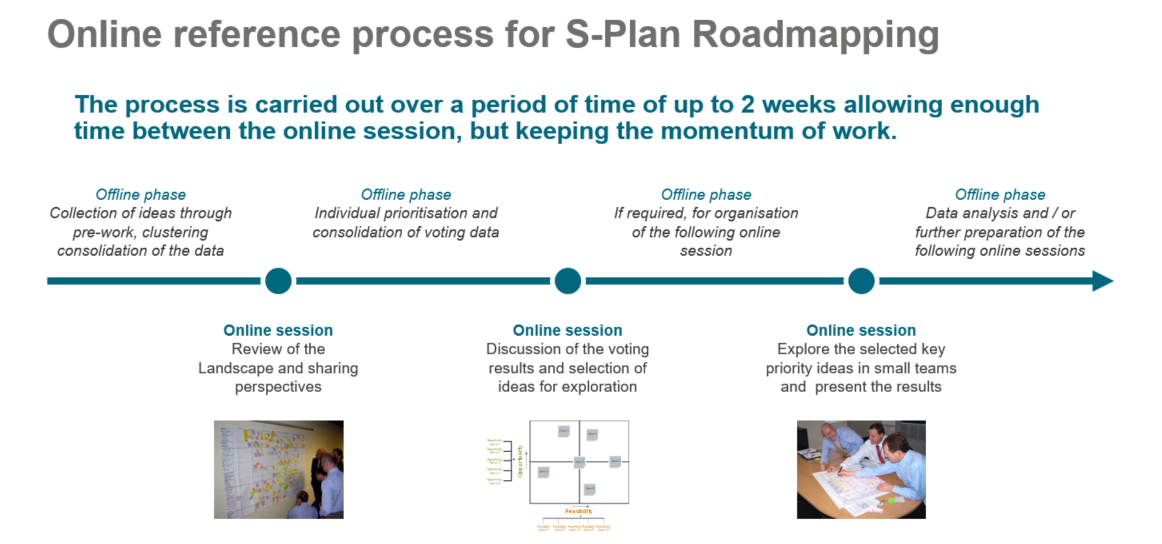Virtual workshops: Top tips for remote collaboration

Remote distancing and lockdowns have sent organisations scrambling to recast face-to-face workshops as virtual events, and to develop new ways to keep their activities running.
At IfM Education and Consultancy Services, we have been helping our partners to respond flexibly and adapt their workshops for remote delivery. Our in-house facilitators, Dr Imoh Ilevbare and Dr Diana Khripko, share their experience and insights on how they design online workshops that achieve the desired outcomes.
 Understand the differences in focus
Understand the differences in focus
The context of virtual workshops means that the design and preparation needs to be structured in a completely different way from face-to-face engagement.
We find that participants' engagement and focus online is excellent, but attention spans are shorter, so workshops need to account for this. Instead of designing a workshop across one or two days, you need to split up sessions across an extended period - sometimes across a few weeks or more depending on what you are trying to achieve.
There are advantages in this approach over face-to-face workshops. By having multiple short and focused workshops of 1-2 hours, you can design a project so delegates have more time for review and reflection between sessions.
Take a prioritisation workshop as an example, where participants review the importance of potential projects and ideas. For an online workshop, you will need to consider elements of the process that can be done offline and elements that require discussion. When we facilitate prioritisation sessions, participants can work through the scoring of projects offline, making space for debate during the online workshop so the group has the time and space to reach a consensus.
It's important to note that this may not always be appropriate - you may want to get instinctive reactions to questions rather than careful consideration, in which case you would include scoring as part of the online workshop instead.
All stages of the process need to be designed carefully with a focus on how participants will engage and respond, so that the online context is not a barrier but an enabler.
Image: Assess the opportunity and feasibility of new projects using the IfMs Portfolio Prioritisation tool
 Maximise participation
Maximise participation
A workshop is only as good as the experts you bring to the virtual meeting space, and getting the dates in the diary for key participants is vital.
Face-to-face workshops are usually delivered across one or two days, so participants are engaged in the process from start to finish. As virtual workshops are delivered in shorter blocks (1-2 hours) over a longer period (1-2 weeks), if you don’t manage participation carefully, you may find participants attend only one or two of the sessions, which is less than ideal.
Getting full participant involvement is vital for a couple of reasons.
Ensuring a consistent set of participants throughout the sessions means you spend less time summarising previous sessions. Where participants are unable to attend, it can be useful to set aside time to bring them up to speed through a short briefing document or call.
Participants will get into a flow both during and in-between workshops when they have the opportunity to reflect and consider their views. You don’t want to disrupt this, and it should be a priority to get them contributing consistently from the start to the end of the project.
"I wasn't expecting this to work so well in this format - but I think it might actually have been better than face to face - it created more focus and people were more conscious of letting other people speak" - delegate feedback from an online workshop delivered in May 2020
 Keep frameworks and outcomes in mind
Keep frameworks and outcomes in mind
A strategic framework is a fundamental part of any successful workshop. All of our workshops, both in-person and virtual, are based on frameworks and approaches developed through research at the Institute for Manufacturing (many of which are freely available to download online, including roadmapping templates, a Make-vs-Buy framework and the IfM Portfolio Prioritisation tool). We use and adapt these frameworks to fit with the multi-stage workshop format of the project.

When adapting frameworks for each stage it's important to focus on outcomes - what you need to achieve to be in a position to move on to the next stage of the project. Engineer the process and create SMART objectives for each session; this level of detail will help to provide participants great experience, bringing them on a journey with you.
 Learn to interpret virtual feedback
Learn to interpret virtual feedback
For face-to-face workshops, facilitators need to be flexible in the way they deliver the session - you get a lot of feedback in the room from visual clues, the way people are sitting, the quantity of responses to questions and the health of the debate. Where you feel a process is not working as it should, you adapt quickly to ensure the workshop gets back on track.
In a virtual environment, many of these clues are missing, so you need to ensure there are appropriate channels and mechanisms to measure engagement in the process.
Make sure that participants have a direct and open mechanism to contact you both during the workshop as well as between sessions; chat functionality and direct emails work well but participants need to know you’re open and looking for feedback throughout the process.
You may receive emails or messages which highlight that people are not keen on the current process, or are challenging certain elements of it. You need to be responsive to this feedback, and adapt your process where appropriate to ensure the room stays on track and engaged.
Have regular check-ins with project leads to make sure that they are happy with the outcomes you have achieved thus far, so you have opportunities to modify sessions to ensure they get the information they need by the end of the project.
 Heighten your facilitation skills
Heighten your facilitation skills
We had a project recently where a prioritisation task proved to be contentious, so the engagement at the start of the activity was lower than we expected. We quickly received a flurry of feedback indicating that participants were worried that their projects were going to be dropped.
 In a virtual environment, there is the potential to lose sight of the individuals and personalities on the other end of the meeting space. For this reason, it's really important to pay attention and think about how you manage the human element of the session. Actively ask for feedback between different steps, using previously mentioned feedback mechanisms as well as presenting an openness and approachability to the room.
In a virtual environment, there is the potential to lose sight of the individuals and personalities on the other end of the meeting space. For this reason, it's really important to pay attention and think about how you manage the human element of the session. Actively ask for feedback between different steps, using previously mentioned feedback mechanisms as well as presenting an openness and approachability to the room.
In the example we mentioned, after consulting with the project lead, we quickly adapted the process to score projects at a theme level, rather than individual identifiable activities, which transformed the engagement in the room as participants were no longer focused on protecting their patch.
 Make sure you’ve sorted the tech
Make sure you’ve sorted the tech
It goes without saying that the right software is vital to any online meeting - the last thing you need is patchy performance of your virtual meeting space. Control every element of the process that you can by testing and testing again, and always having a plan B. For instance, if you’re using Zoom as your primary video conferencing software, make sure you also have an alternative option e.g. Webex or Skype, with all participants' relevant contact details to hand should there be any unforeseen technical glitches.
But don’t get carried away with software and always keep the desired outcomes in mind when considering what applications and functionality you could use. Software is just an enabler, and whilst bells and whistles functionality might sound attractive, in practice it can sometimes confuse and lose participants, resulting in a well-planned and structured agenda failing and failing fast!
How IfM ECS can help
There are many benefits to remote delivery of workshops: they can save time and costs, be better for the environment and in some cases generate richer quality outputs.
Whether it be online or face-to-face, speak to one of our industrial associates if you are interested in running a strategic workshop in your own business. Contact Dr Diana Khripko, Solution Development Specialist, to discuss any aspect on remote workshop delivery - email dk530@cam.ac.uk.
Feedback from recent online workshops delivered by IfM ECS
"It was smooth and enjoyable! I felt there was confidence from our group side too"
"Our group was really confident in the process after this session, and came to a consensus quickly."
"I think the workshop went very well - thanks for running it so smoothly!”
"I thought it went really well! Thank you so much for doing such an outstanding job."
"I wasn't expecting this to work so well in this format - but I think it might actually have been better than face to face - it created more focus and people were more conscious of letting other people speak"









